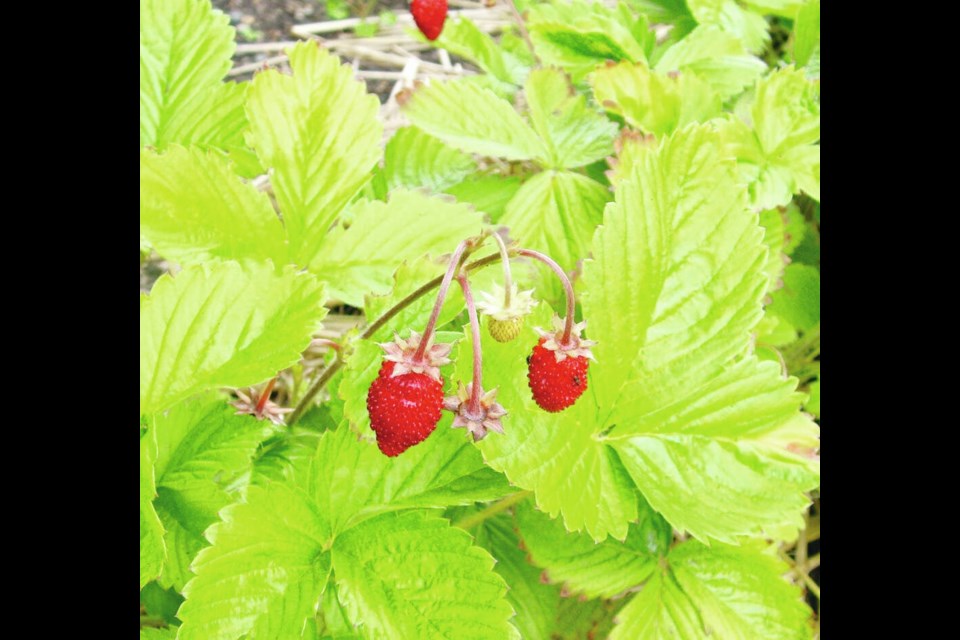As challenging as this year’s growing season has been, in most home gardens there have been pleasure peaks as well.
I’m fond of having easy access to in-garden snacks. Being able to munch and crunch my way around the food garden is a satisfying reward for the work that goes into nurturing tasty edibles.
Snow peas, blueberries, juicy golden purslane, tangy parsley, pungent stem tips of ferny licorice marigold (Tagetes filifolia, Mexican marigold), miner’s lettuce, golden raspberries and more all present opportunities for seasonal garden snacking.
This summer, every garden session has been blessed with a “time-out” to feast on a fairly new planting that has been hyper-productive of treats in diminutive but intensely flavour-packed morsels.
Last year, I decided to seed a fresh batch of alpine strawberries, with the intention of creating an easy-access planting along a suitable pathway edge, to replace the random plants scattered through the garden — results of self-sowing from older plantings.
I chose two varieties, for purposes of comparison: Alexandra (J.L. Hudson, Seedsman) and Mignonette (Renee’s Garden). I set the transplants out in the spring, along a curved pathway on the sunny side of the kiwi vines.
Last summer, the little plants produced modest numbers of little berries. This past spring, I cleaned the plants up, mulched around them with compost, and topped the compost with straw to help conserve moisture in and cool the soil and to keep the berries clean. Through the summer, I’ve been able to count on savouring fully red-ripe, flavour-packed little berries on those tiny plants, every time I pass by the planting.
In comparing the two varieties, the Alexandra plants are bigger and bushier, with slightly higher numbers of berries. The smaller Mignonette plants appear closer to wild types of alpine strawberries. I find their berries sweeter and more deeply flavourful.
The saying “Don’t judge a book by its cover” comes to mind. Another example can be found in seedlings of flowers in colour mixtures. The weakest looking ones will often bear the most beautiful colours in the blend.
Perpetual potatoes
As I began cleaning a small corner of a vegetable plot to make way for lettuce transplants, I saw a potato salad in my near future as I dug up random potato plants that had sprouted there from tubers missed at last year’s harvesting.
They are small, easy to miss fingerling potatoes, AmaRosa and Bellanita. Over the past few years, new plants have sprouted in that space and every year the potatoes seem to become more productive.
Letting “volunteer” potatoes grow is not always a good idea. The plants can be bearers of diseases that can be passed along to tomatoes and other potatoes in the garden. I’ve kept a close eye on both these plantings in recent years, and with no signs of major problems like blight, I’ve let the little self-perpetuating potato planting grow. The hot, dry weather we’ve been having does not favour major diseases of tomatoes and potatoes.
GARDEN EVENTS
Abkhazi Garden, 1964 Fairfield Rd. in Victoria, invites the public to view paintings and sketches inspired by the beautiful garden and created by local artists who have been part of the Artists in the Garden program. The art will be on display from Labour Day (Monday, Sept. 4) to Oct. 9, from 11 a.m. to 4 p.m. daily. On Labour Day, weather permitting, artists will be in attendance with their artwork on display in the garden. Starting on Sept. 6, the artwork will be on display in the tearoom and gift shop.
VHS meeting. The Victoria Horticultural Society will meet on Tuesday, Sept. 5, from 7 to 9 p.m. in the Garth Homer Centre, 813 Darwin Ave. Josh Wagler, co-founder of Edible Landscape Design, will speak about ways to integrate food growing into home gardens, no matter whether the space is small or large, shady or sunny. Non-member drop-in fee $5. vichortsociety.org.
Gordon Head meeting. The Gordon Head Garden Club will meet on Wednesday, Sept. 6, from 7 to 9 p.m. in the Gordon Head Lawn Bowling Club, 4505 Lambrick Way. Jillan Tuson, an arborist with the Saanich municipality, will speak about the Urban Forest Strategy for tree planting and small tree maintenance, including the impact of climate change on establishing new trees. Visitors are welcome at no charge.



